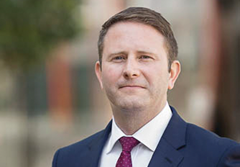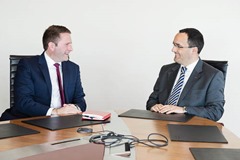Delivering innovative solutions
 Kevin Duffy, Head of Health and Public Service Delivery for Accenture in Northern Ireland, talks to Owen McQuade about the company’s plans for expansion in Northern Ireland and offers some insights into large scale transformation across public services.
Kevin Duffy, Head of Health and Public Service Delivery for Accenture in Northern Ireland, talks to Owen McQuade about the company’s plans for expansion in Northern Ireland and offers some insights into large scale transformation across public services.
Global consulting and technology firm Accenture has been operating in Northern Ireland for seven years. The firm is the largest technology, consulting and outsourcing organisation in the world. “In that time we have delivered some great work here in finance, central government and health, and we continue to work in these areas today,” outlines Kevin Duffy, Head of Health and Public Service Delivery with Accenture Northern Ireland.
“We’re not the type of organisation that leaves you with a plan or a report. Accenture is about delivering innovative technology-based solutions and services that address complex problems; and we do this by working in partnership with each and every one of our clients.
“Northern Ireland remains an exciting place in terms of public services with some very real opportunities for transformation on a large scale.” Duffy sees significant growth potential, particularly in healthcare and justice, presenting “wonderful opportunities for private and public to come together to deliver truly innovative solutions.”
Healthcare
Duffy sees the Transforming Your Care programme as a real game changer for health and social care in Northern Ireland: “I do personally believe the direction of travel is the right one, but I also recognise that difficult decisions need to be taken now that may affect my family and me in the future. The need for a sound evidential platform to underpin these decisions has never been clearer in my mind therefore.”
He sees some of the healthcare work that Accenture has undertaken in the Basque region as having direct parallels to Northern Ireland. Since 2009, Accenture has been working in the Basque region of Spain to tackle the challenges of increasing chronicity. Duffy says that this work has delivered on many of the fronts that Transforming Your Care is looking to address over the next five years.
The challenges posed by increased chronicity are well documented. In the Basque region, 77 per cent of expenditure in the system related to the treatment of patients with chronic conditions. In addition, 80 per cent of visits to health and social care organisations in the region were by chronic patients.
For a patient with more than one chronic disease, it could cost up to six times more to care for that patient than it would had they only one chronic disease: “So you can see the burden increased chronicity can place on a health system and with a similarly ageing population in Northern Ireland, it is clear we need to act, and act quickly.”
In the Basque region, Accenture employed some “really smart predictive analytics: our own approach to working out when people are arriving at their most dependent years so that you can quite rightly point the resources at the right place at the right time and in the right quantity to deliver the best outcomes and best quality of care you can.” Accenture demonstrated that its approach was twice as effective as the traditional Community Assessment Risk Screening (CARS) approaches in the area.
“On the health management side,” he says, “we have created some innovative technology solutions such as ‘Teki’ which uses the Kinect platform from Microsoft to lead patients through their daily exercise regime and provide 1:1 access to clinicians through their TVs. Patients can also give key readings (e.g. for COPD) using other solutions we have interfaced with the Kinect platform, which send readings directly to their care providers in the local health authorities. This approach has reduced the length of stay in hospitals and it is estimated that the savings per patient per year (brought about by Teki) is equivalent to one and a half nights at in hospital.”
Accenture has also worked with the Madrid Health Authority over the last decade to create a seamless integrated information exchange covering hospitals, A&E departments, patients and GPs. This gives a transparent single view of the patient across the healthcare system.
Duffy believes that this work, which is “on our doorsteps,” and other work Accenture is doing in the US, Canada and the rest of the world could really help shape “how we go about translating vision in to action here in Northern Ireland.”
Justice is another area in which Accenture sees opportunity to bring learnings and insights from work already delivered in other parts of the world to Northern Ireland. Since 1992, it has delivered the core policing, immigration and finger-printing systems for An Garda Síochána in the Republic of Ireland. In Great Britain, it has worked with the Home Office and ACPO (the Association of Chief Police Officers) to provide the performance assessment framework for 43 police forces across England and Wales.
Accenture is currently working with the UK Ministry of Justice on a programme to take the old legacy IT systems and modernise them into web-based case management tools and systems to streamline the justice system.
Duffy can see the applicability of this work in Northern Ireland, particularly as we continue to strive to remove avoidable delay.
“There are some really exciting things we are doing around integrated justice that bring together modern technologies with improved business processes that really make a difference.”
He explains: “For example, we have rolled out high quality video conferencing facilities across some courtrooms in the UK. Not terribly innovative you might say but they have really made a difference. Take the victim who perhaps is reluctant to give evidence in a court of law because of the fear they have of their attacker.
There is evidence to show that these victims feel that they are able to give better testimony away from the glare of their attacker. We no longer need to move prisoners, which is both expensive and also risky. Police officers who need to give evidence in several cases in one day [because of the availability of judges] can actually do so from their own police station.”
“These solutions deliver benefits that far outweigh the costs. It’s not just technology for technology’s sake. It’s about looking at a challenge differently, putting the right processes in place, and using technology in the right way to drive out real benefits, and that’s something that Accenture does really well,” adds Duffy.
Data analytics
Accenture uses advanced data analytics to support high performance across multiple business functions. Organisations can accelerate product innovation by better understanding market gaps, new opportunities and customer needs.
The company has worked around the world on the challenges around welfare fraud and erroneous claims. In the Republic of Ireland, for example, Accenture has worked with the Revenue Commissioners using predictive analytical techniques to identify false claims and eradicate them.
“There are a couple of direct benefits from this,” Duffy outlines. “First and foremost, erroneous claims can be found and stopped. From a customer service point of view, it means that compliant claims are actually getting through the system quicker so customers are happy. The cost of recovery is also down because the enforcement is much more targeted in chasing down those claims that are indeed false.” This innovative approach was recognised by winning an Ireland Public Service Excellence Award.
Accenture has a global analytics innovation centre based in Dublin, employing 30 analysts with plans to increase that number to 100 in the near future. The centre currently focuses on the development of sophisticated techniques in fraud and compliance analytics to address many of the key business challenges facing Accenture’s clients. Duffy sees the potential to have a similar hub working out of Belfast: “We have wonderful graduates with the talent and raw materials to excel in data analytics. It’s something we are seriously looking at for Northern Ireland,” Duffy remarks.
As government agencies worldwide face reduced funding and declining revenues, Duffy says that it is “a natural step to turn to procurement as a means to save money”. He believes that public service executives also need to “aim high, using innovative, connected procurement techniques to cushion the impact of turbulent times and help drive economic growth”.
There are a number of initiatives which can be developed to improve cost savings within public sector agencies. These include introducing cloud computing to help government procurement introduce a single coding standard for classifying spend; one collaborative approach to buying; and a lone infrastructure for analysing and reporting information across agencies.
Consolidating operations further by extending centres of procurement excellence (CoPEs) such as the Central Procurement Directorate (CPD) and PaLS (Procurement and Logistics Service) into a “middle office” that serves lower cost areas will reduce facilities costs, lower headcount, eliminate redundant activities, encourage on-contract buying, process standardisation, and simplify the task of enacting and measuring continuous improvements.
Growing Northern Ireland
Duffy sees significant growth potential for Accenture in Northern Ireland: “The question for me is ‘how quick we can do that’ not ‘if we will’. By giving our young people the right opportunities to develop and grow and prosper in Northern Ireland, I am hopeful we can grow our operations fairly quickly.”
One opportunity that Duffy has already identified is the launch of the European Innovation Partnerships (EIPs) which should bring great opportunities to Northern Ireland as a reference site. Duffy sees Accenture as being very well-positioned to help Northern Ireland to realise the benefits from EIPs.
“Our pan-European reach and work on healthcare programmes across Europe means that we have a network of relationships and organisations that we can link into,” he says in conclusion. “It’s an area that I’m very interested in because I think it presents a really wonderful opportunity for Northern Ireland in the future to sustain the great work that we are currently doing in healthcare reform and connected health.”
Profile: Kevin Duffy
Originally from Enniskillen, Kevin studied Information Management at Queen’s University Belfast, followed by an MSc in Technology Management at the University of Manchester. Kevin then went into consulting, starting his career in London. He currently lives in Belfast with his wife and two young sons.
Reflecting on his experiences over the last 13 years. “Public and Private organisations need to be less cautious at times believing in their vision, believing in their staff and their ability to handle change, and believing in the technology. There are great examples of organisations doing this in Northern Ireland right now and we should be celebrating their successes and encouraging more to take the leap. We might be surprised by the results.”







